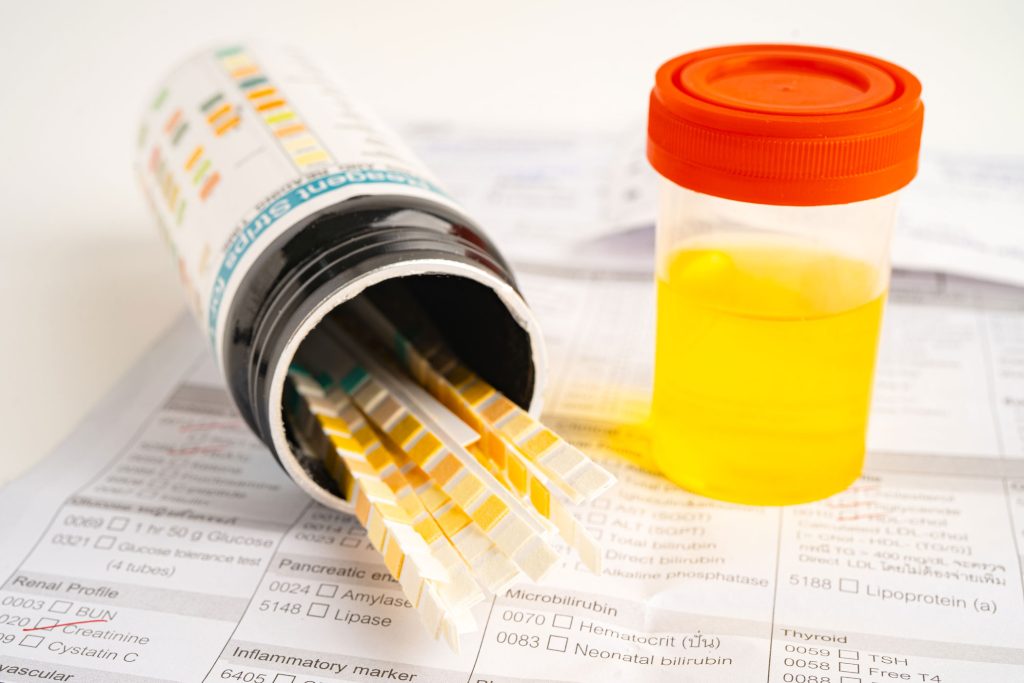Table of Contents
ToggleNoticed your urine colour is darker than usual, perhaps looking like tea-coloured urine? While a change in your pee colour can be due to something harmless, it may also signal an underlying medical issue that needs attention.
The purpose of this guide is to explore the various reasons for a change in urine colour. We will cover what causes tea-coloured urine, helping you understand the signs that suggest it might be a cause for concern.
Common and Less Worrying Causes of Tea-Coloured Urine
Dehydration
Are you getting your recommended eight glasses of water daily? If not, dehydration may be the cause of your dark urine colour. When you do not drink enough fluids, your urine becomes more concentrated. Concentrated urine can appear dark yellow or brown, sometimes resembling tea.
Increasing your fluid intake should typically cause your urine colour to return to a lighter, clearer shade.
Certain Foods and Medications
Some items can temporarily alter your pee colour. Examples include:
- Fava Beans and Rhubarb: Eating large quantities of these foods can sometimes cause urine to turn dark brown or tea-coloured.
- Beetroot: Well-known for turning urine pink or red, very high consumption can sometimes contribute to a darker hue.
- Certain Laxatives: Laxatives that contain senna or cascara can darken the urine colour.
- Specific Antibiotics: Medications like metronidazole and nitrofurantoin are known to sometimes cause dark brown urine.
- Other Medications: Some muscle relaxants, antimalarial drugs, and other medications can also affect your pee colour as a side effect.
An unusual urine colour caused by foods or medications is normally a temporary and harmless side effect that resolves once the item is out of your system.
When Tea-Colored Urine Might Be a Sign of a Medical Issue
Liver Problems
Liver conditions like hepatitis (liver inflammation) or cirrhosis (scarring) can impair the liver’s ability to process bilirubin, a yellowish pigment created from the breakdown of old red blood cells. A healthy liver converts and excretes this pigment, but a damaged one cannot keep up.
When bilirubin builds up in the blood, it causes jaundice (yellowing of the skin and eyes) and can be excreted in the urine, turning the urine colour dark brown.
Bile Duct Obstruction
The bile ducts are tubes that carry bile, containing processed bilirubin, from the liver to the small intestine. Should these ducts become blocked, perhaps by gallstones or a tumour, bile cannot drain properly and backs up into the bloodstream.
Similar to direct liver problems, this leads to an accumulation of bilirubin, causing jaundice and tea-coloured urine. This may also be accompanied by pale stools and itchy skin.
Kidney Problems
Certain kidney disorders or infections can damage the kidney’s delicate filtering system. A condition known as glomerulonephritis, for instance, can cause red blood cells to leak from the bloodstream directly into the urine. In this case, the dark urine colour is caused by blood itself (haematuria), not bilirubin, and may appear dark like tea or cola. Other signs of kidney issues can include swelling in the legs.
Hemolytic Anaemia
Hemolytic anaemia is a disorder where red blood cells are destroyed faster than they can be made. During this rapid breakdown, substances from within the red blood cells, such as haemoglobin, are released into the bloodstream and then filtered by the kidneys, which can cause a dark brown or reddish urine colour.
Rhabdomyolysis
Intense and strenuous exercise can sometimes lead to a serious condition called rhabdomyolysis, where muscle tissue breaks down rapidly. A breakdown of muscle releases a protein called myoglobin, which can leak into the urine, turning it tea-coloured. A condition like this requires immediate medical attention to prevent kidney damage.
Accompanying Symptoms That Warrant Concern
A change in your urine colour on its own may not be serious, but you should pay close attention if it appears with other new symptoms. The presence of accompanying signs makes it more important to seek medical advice.
Some of these more concerning symptoms include:
- Jaundice (yellowing of skin and eyes): If you notice yellow eyes or skin alongside dark urine, it strongly suggests that your body is not processing bilirubin correctly, pointing towards a potential liver or bile duct problem.
- Pale, Clay-Coloured Stools: Stool gets its typical brown colour from bile. If your stools are pale, it indicates that bile is blocked from reaching your intestines, which is a significant finding when seen with tea-coloured urine.
- Abdominal Pain: Sharp pain, especially in the upper right abdomen where your liver and gallbladder are located, could signal gallstones or liver inflammation. Pain radiating to the back is a classic symptom of pancreatitis.
- Unexplained Fatigue or Weakness: While non-specific, persistent and unusual fatigue can accompany chronic liver conditions or aanemia, as your body works harder to cope with the underlying issue.
- Fever or Chills: A fever could mean there is an infection in your liver (hepatitis), bile ducts (cholangitis), or kidneys. When combined with changes in urine colour, it warrants a prompt medical evaluation.
- Severe Muscle Pain: As mentioned earlier, intense muscle pain coupled with dark urine can be a sign of rhabdomyolysis, a condition that can lead to kidney damage and requires immediate attention.
- Swelling in the Legs or Abdomen: Fluid retention, known as oedema (in the legs) or ascites (in the abdomen), can be a symptom of compromised liver or kidney function.
- Changes in Urination: Any pain during urination, difficulty starting, or a noticeable change in frequency could indicate that the problem originates within your urinary tract or kidneys.
What to Do If You Notice Tea-Coloured Urine

It is useful to first observe your situation. Note when the dark urine colour started and consider any unusual foods you have eaten, new medications you are taking, or if you have been exercising more intensely than usual.
You should seek medical attention promptly if the dark urine persists for more than a day or is accompanied by any of the concerning symptoms listed above, such as jaundice or pain. Your doctor will ask about your history and may order urine and blood tests to investigate the cause.
For persistent concerns about tea-coloured urine or liver-related symptoms like jaundice, scheduling a consultation with a hepatobiliary specialist or a jaundice doctor can provide a specialised assessment and peace of mind.
